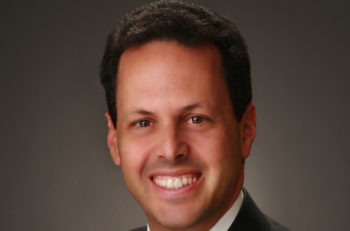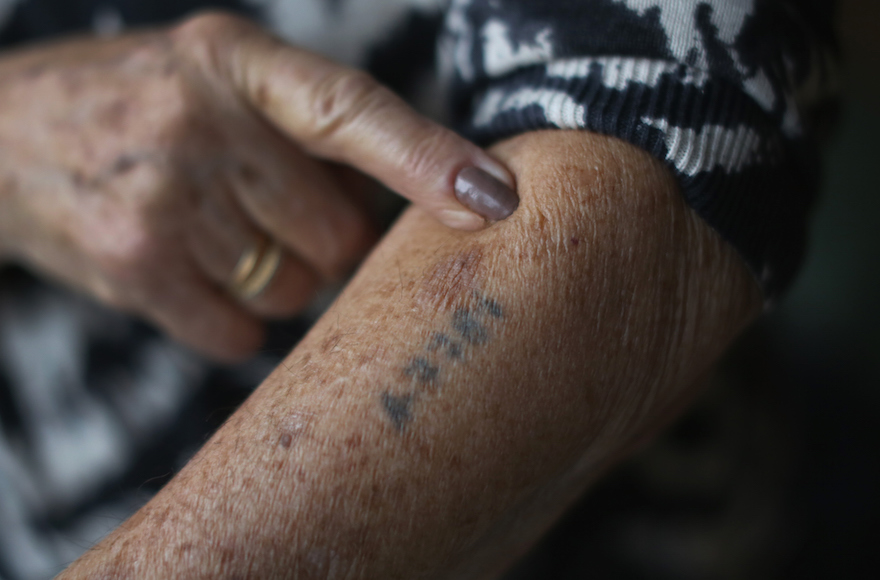(JTA) — They survived unimaginable horrors, yet went on to live productive lives, despite the haunting memories, the profound loss and physical scars from years of deprivation. Now many Holocaust survivors need our assistance so they may live their twilight years with dignity in their homes and communities.
Most Holocaust survivors are in their 80s and 90s, and an astounding 25 percent of them in the United States live in poverty, struggling to meet basic needs for food, housing, health care and transportation. Many live alone and have no extended family who survived the Holocaust. Spouses who used to provide support are no longer living. Each year, just as we lose many survivors, we also see others coming forward, identifying themselves as Holocaust survivors in desperate need of assistance.

Mark Wilf (Courtesy of Wilf)
As survivors age, they face challenges different from other older adults. Some suffer from delayed-onset post-traumatic stress disorder, making it more difficult to live in assisted living or nursing homes, where institutional life, with its uniformed staff, regimented schedules and rules can lead to flashbacks of concentration camps or other periods of confinement. Unfamiliar showers can be a frightening reminder of gas chambers.
Multiple studies have found that survivors are more likely than others to experience anxiety and nightmares.
We cannot let this happen.
For many survivors, social services are their lifeline. Home care, the most expensive of these vital services, costs an average of $20 per hour per survivor. With approximately 125,000 Holocaust survivors in the U.S., it will take extensive resources to serve even the neediest of survivors. The German government, through the Conference on Jewish Material Claims Against Germany, provides the majority of the funding for social services, but survivor needs are exceeding available funding.
Local communities have taken note, and we’re inspired by the philanthropic campaigns that are working to educate the community. Together we’ve raised more than $30 million over the past couple years.
READ: Obama administration earmarks $12M for Holocaust survivors
Additionally, companies have stepped up to help. We’re grateful for the partnership between the Alpha Omega dental fraternity and Henry Schein Cares to offer Holocaust survivors pro bono dental care, and the generosity of the Starkey Hearing Foundation to provide hearing aids free of charge to survivors in need.
Finally, government leaders are recognizing the specialized assistance that aging Holocaust survivors require. Vice President Joe Biden announced the White House’s initiative to help Holocaust survivors in 2013. This resulted in numerous avenues for assistance.
On International Holocaust Remembrance Day earlier this year, President Barack Obama declared, “Governments have an obligation to care for the survivors of the Shoah because no one who endured that horror should have to scrape by in their golden years.”

Todd Morgan (Courtesy of Morgan)
In March, Jewish federations distributed $2.8 million in federal grants to assist programs for Holocaust survivors. Coupled with the required matching funds, the disbursement results in $4.5 million for survivor services. For the first time, the federal government will soon issue guidance to states on serving Holocaust survivors, as required by the Older Americans Act Reauthorization that cleared Congress in April.
A few states and local governments are providing assistance as well. In Florida, for example, local Jewish federations worked together to obtain a special state appropriation for Holocaust survivor services, while in New York City last year, the mayor and City Council approved a budget including $1.5 million to assist Holocaust survivors living in poverty. More states and local governments should follow these leads in pursuing special appropriations.
Perhaps more impactful is that we encourage Germany to continue to fulfill its moral responsibility by providing additional financial resources for social services for Holocaust survivors, as recently called for in bipartisan resolutions in the U.S. House and Senate.
Both of our families managed to overcome great odds and survive the Holocaust, fortunate to be able to re-establish their lives in America and prosper. Not every Holocaust survivor was so lucky. They are the survivors who need our help. We must volunteer our time, visit Holocaust survivors and engage them in their Jewish communities.
READ: Many Holocaust survivors live in poverty and need assistance, confab told
These survivors are our heroes, our teachers and our mentors. One day they will no longer be with us. Until that day comes, we are obligated to ensure that they live their remaining days and years in dignity.
When future generations ask if the Jewish community took care of its Holocaust survivors, let that answer be a resounding “yes.”
(Mark Wilf is president and co-owner of the Minnesota Vikings and a board member of JTA’s parent organization, 70 Faces Media. Todd Morgan is the founder and chairman of Bel Air Investment Advisors. Together they co-chair the the Jewish Federations’ Fund for Holocaust Survivors.)
JTA has documented Jewish history in real-time for over a century. Keep our journalism strong by joining us in supporting independent, award-winning reporting.







